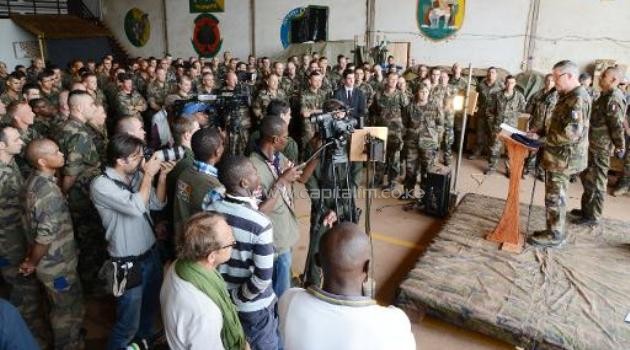
French Army Chief of Staff Admiral Edouard Guillaud addresses soldiers on Febuary 3, 2014 at the Mpoko camp in Bangui/AFP
BANGUI, February 4- Two months after French military intervention in the Central African Republic, French troops and African soldiers have largely disarmed Muslim ex-rebels in the capital, but major atrocities prevail.
French Foreign Minister Laurent Fabius said Tuesday that “at the security level, there are signs of pacification. The African troops are gaining strength. European troops are going to join us.”
French chief of defence staff Admiral Edouard Guillaud has said in Bangui that “the violence has been partly halted” by the 1,600 French soldiers who deployed on December 5 alongside the 5,500 troops of an African peacekeeping force (MISCA).
But the French and African troops operate largely in the capital, where the Red Cross last week reported finding 30 bodies in three days, while the Muslim-Christian bloodletting continues in the interior.
A priest in the town of Boda, 100 kilometres (60 miles) west of Bangui, on Monday told AFP that his parish was sheltering 1,500 people after heavily armed Muslims killed 75 Christians.
In Bangui, foreign troops have largely neutralised the mainly Muslim fighters of the Seleka alliance that seized power in March 2013 and launched a campaign of killings, torture, rape and looting against the Christian majority.
Asked on Monday whether the time had come to also round up and confine the Christian vigilante groups formed in response to the Seleka attacks, Guillaud replied that “in Bangui, it’s not only Muslim civilians who are killed. There are atrocities by both sides.”
Little by little, MISCA contingents, backed by French troops, have started to move into dangerous areas where Christian “anti-balaka” (anti-machete) militia target the remaining Muslim population, AFP reporters have seen.
But the foreign military presence has yet to stop killings, as in the capital’s Miskine district where Burundian soldiers have a hard time preventing daily attacks on the last Muslims to stay in their houses and shops, unwilling to join hundreds of thousands of displaced people.
Camp rife with weapons
Months of a reign of terror by Seleka forces has unleashed unprecedented animosity between the impoverished country’s religious communities, leading the United Nations and the United States to warn that conditions are ripe for a potential genocide.
The main anti-balaka base known as “Boeing”, on the edge of a displaced people’s camp housing 100,000 people near Bangui airport, is rife with weapons, according to Human Rights Watch (HRW).
“They have a thousand grenades, loads of rifles,” HRW’s Peter Bouckaert said.
General Francesco Soriano, commander of France’s Operation Sangaris, recently told AFP that his men had seized more than 4,000 knives, clubs and machetes and “hundreds of rifles” from both former Seleka fighters and the Christian vigilantes. The general denied taking sides.
“In Boali (90 kilometres, 55 miles north of Bangui), we arrived at the height of a massacre and we have stayed there since,” he said. French troops arrived in mid-January and saved hundreds of Muslims for anti-balaka forces.
French Minister for Relations with Parliament Alain Vidalies said in Paris Tuesday that lawmakers will vote on February 26 on prolonging the mandate of Operation Sangaris beyond the four months stipulated by the constitution.
Between now and the vote, a parliamentary delegation will visit the CAR to assess the situation on the ground, Vidalies said, amid growing opposition fears that the soldiers may become bogged down.
On Saturday, African Union nations met in Addis Ababa to raise funds for MISCA. Ethiopia pledged $500,000 (370,000 euros), while South Africa promised one million dollars. The EU has for its part offered 500 troops and $150 million in support for security and an electoral process.
But in the meantime, most of the country remains out of the control of international forces.
At Sibut (180 kilometres north of Bangui), ex-Seleka forces agreed to be placed in barracks when French and African troops arrived, but instead the former rebels took advantage of a tremendous storm overnight on Saturday to flee.
Paris now appears to be counting on a UN mission. “There is a peacekeeping operation in prospect. Probably as of the summer, the UN will take up the baton,” with 10,000 soldiers, according to Fabius.









































